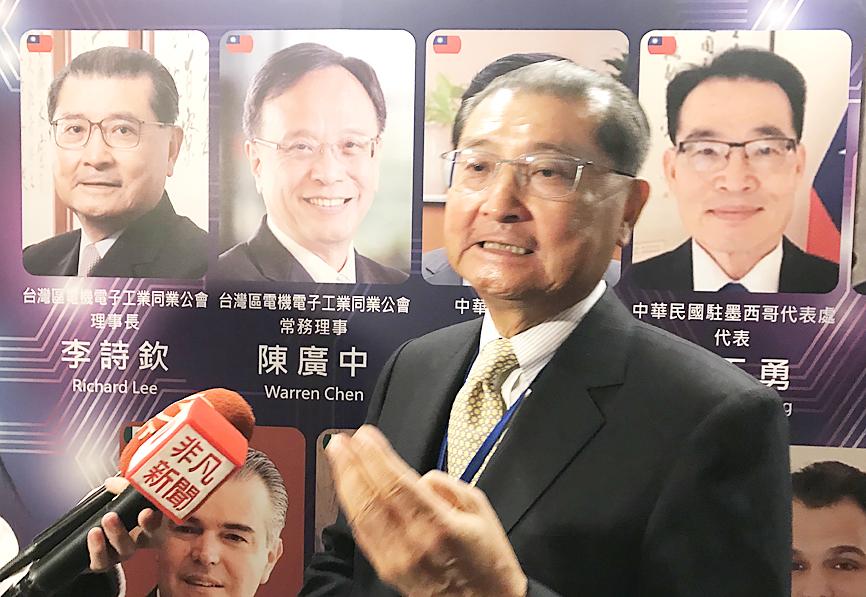Taiwanese companies should look to Mexico to diversify their production exporting to the US market and enhance risk management in supply chains, Taiwan Electrical and Electronic Manufacturers’ Association (TEEMA, 台灣電子電機公會) chairman Richard Lee (李詩欽) said yesterday.
Lee was speaking at the TEEMA Global Networking Forum, which focused on Mexico, the Czech Republic, Slovakia and the EU as investment hotspots for Taiwanese businesses.
“The advantage of manufacturing in Mexico is the proximity to the US market,” Lee said. “I’m not discounting the possibility of future made-in-US projects, but first we should maximize our Mexican production.”

Photo: Lee Ya-wen, Taipei Times
Lee said that 50 to 60 percent of TEEMA members’ products are made in China, with 20 to 30 percent manufactured in Taiwan or Southeast Asia.
“It is an inevitable trend that global supply chains are becoming more fragmented. It is advantageous to manufacture as close to the market as possible in multiple locations, rather than rely on a central supply chain,” he said.
“Mexico, the Czech Republic and Slovakia are excellent investment destinations for Taiwan, but in time I also expect Mexicans, Czechs and Slovaks to invest in Taiwan,” he added.
Describing trade relations between Taiwan and the forum’s featured destination countries as “keen,” Lee said that TEEMA hopes to promote formal agreements to “solidify the strategic position” of Taiwanese companies hoping to invest there.
“Businesses would like to see the signing of agreements that protect their interests,” he said.
The one-day forum was dedicated to discussing Taiwan-Mexico investment opportunities in the morning, and Czech, Slovak and EU opportunities in the afternoon.
Lee, who is also the former chairman of contract electronics manufacturer Inventec Corp (英業達), responded to questions about investing in India in the wake of a riot last week at a Wistron Corp (緯創) iPhone factory in the country.
“Inventec invested in India years ago, but we were forced to pull out because of problems with our local partners. It caught us totally off guard,” said Lee, who remains on the board of Inventec.
Saying that most Taiwanese businesses that have found success in India supplied the local market, Lee encouraged Taiwanese businesses to see India as an emerging potential market rather than a manufacturing hub.
“Given our experiences, I would say India could be a market for us within five to 10 years of patient development,” he said.
“Taiwan-India relations need to be taken to the next level, but in the meantime, there are other places where we can consolidate our strategic position,” he added.

TRAGEDY STRIKES TAIPEI: The suspect died after falling off a building after he threw smoke grenades into Taipei Main Station and went on a killing spree in Zhongshan A 27-year-old suspect allegedly threw smoke grenades in Taipei Main Station and then proceeded to Zhongshan MRT Station in a random killing spree that resulted in the death of the suspect and two other civilians, and seven injured, including one in critical condition, as of press time last night. The suspect, identified as a man surnamed Chang Wen (張文), allegedly began the attack at Taipei Main Station, the Taipei Fire Department said, adding that it received a report at 5:24pm that smoke grenades had been thrown in the station. One man in his 50s was rushed to hospital after a cardiac arrest

A car bomb killed a senior Russian general in southern Moscow yesterday morning, the latest high-profile army figure to be blown up in a blast that came just hours after Russian and Ukrainian delegates held separate talks in Miami on a plan to end the war. Kyiv has not commented on the incident, but Russian investigators said they were probing whether the blast was “linked” to “Ukrainian special forces.” The attack was similar to other assassinations of generals and pro-war figures that have either been claimed, or are widely believed to have been orchestrated, by Ukraine. Russian Lieutenant General Fanil Sarvarov, 56, head

SAFETY FIRST: Double the number of police were deployed at the Taipei Marathon, while other cities released plans to bolster public event safety Authorities across Taiwan have stepped up security measures ahead of Christmas and New Year events, following a knife and smoke bomb attack in Taipei on Friday that left four people dead and 11 injured. In a bid to prevent potential copycat incidents, police deployments have been expanded for large gatherings, transport hubs, and other crowded public spaces, according to official statements from police and city authorities. Taipei Mayor Chiang Wan-an (蔣萬安) said the city has “comprehensively raised security readiness” in crowded areas, increased police deployments with armed officers, and intensified patrols during weekends and nighttime hours. For large-scale events, security checkpoints and explosives

PUBLIC SAFETY: The premier said that security would be tightened in transport hubs, while President Lai commended the public for their bravery The government is to deploy more police, including rapid response units, in crowded public areas to ensure a swift response to any threats, President William Lai (賴清德) said yesterday after a knife attack killed three people and injured 11 in Taipei the previous day. Lai made the remarks following a briefing by the National Police Agency on the progress of the investigation, saying that the attack underscored the importance of cooperation in public security between the central and local governments. The attack unfolded in the early evening on Friday around Taipei Main Station’s M7 exit and later near the Taipei MRT’s Zhongshan